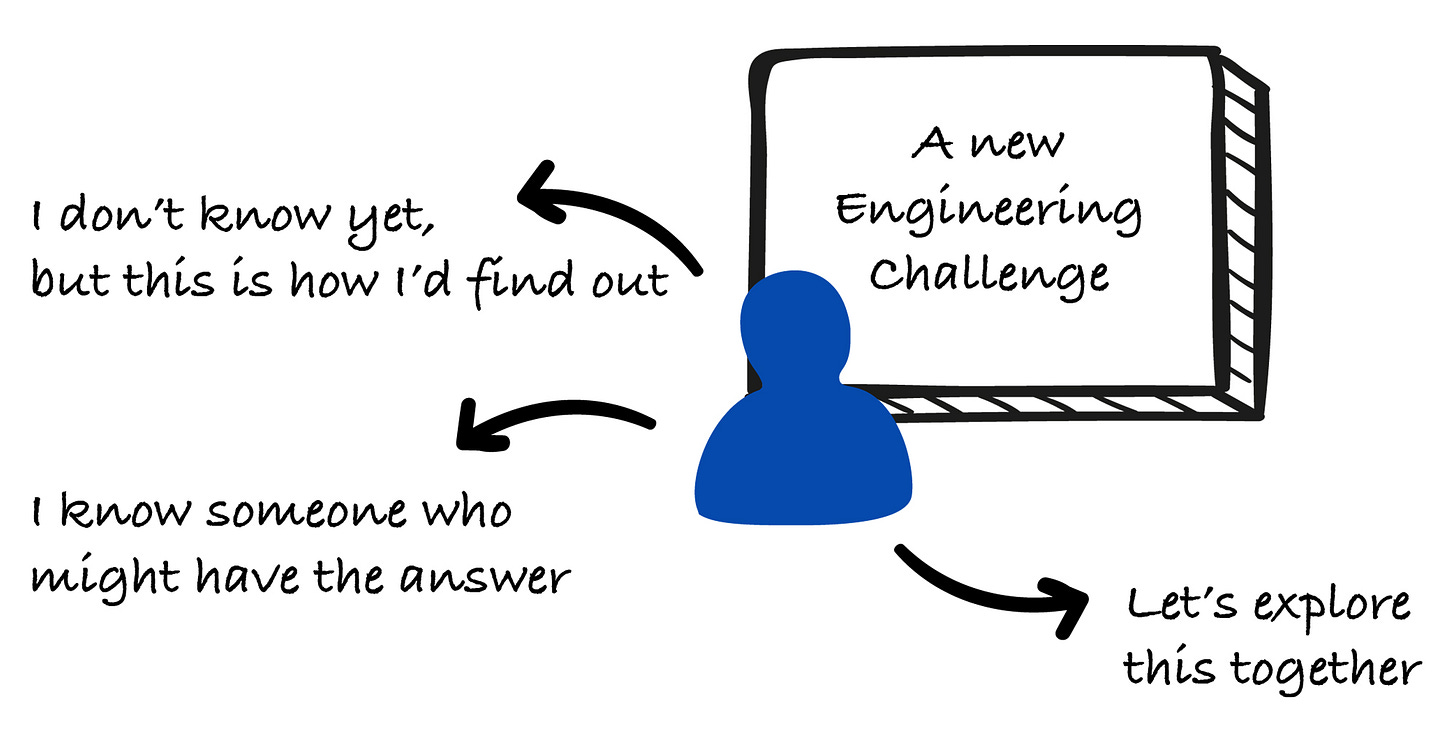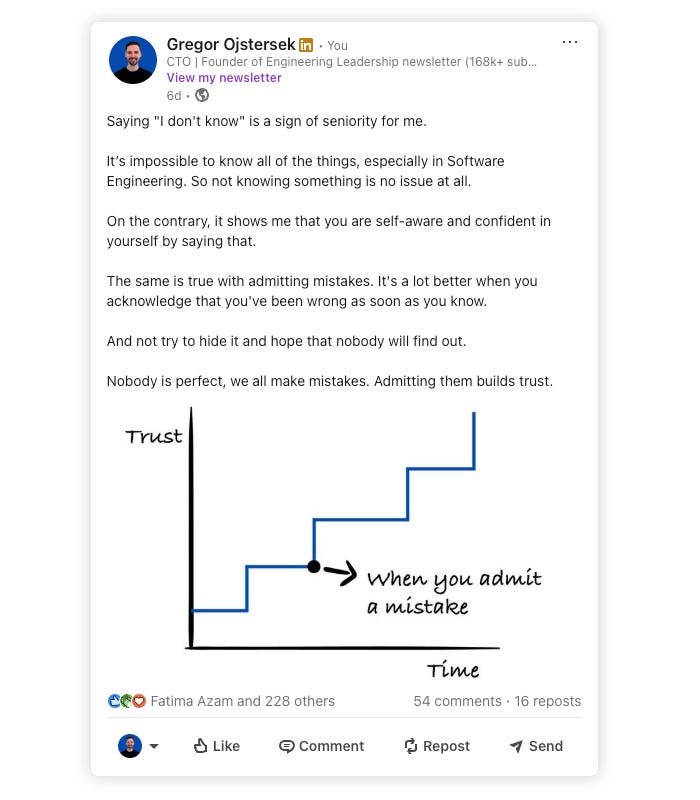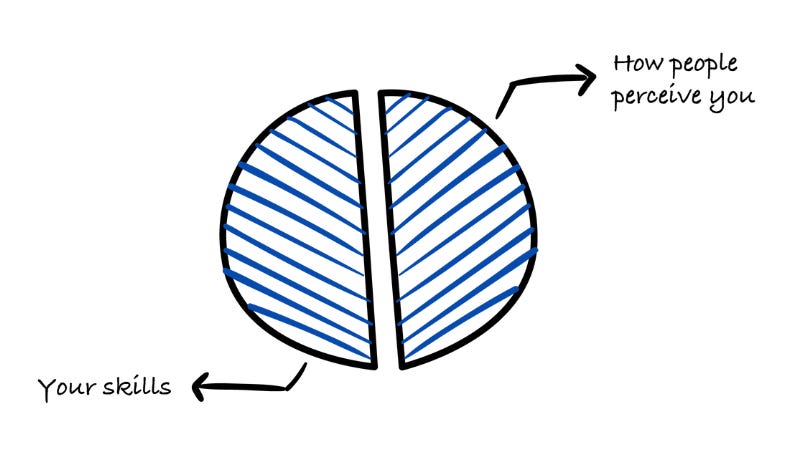Saying "I don't know" Is a Sign of Seniority For Me
Best engineers are honest and curious -> They openly admit when they don't know something, and they are curious to find out what the right answer is!
Intro
Many people believe that not knowing something is a sign of weakness. They believe that openly admitting that they don’t know something would give a negative impression about their overall competence.
And especially in our industry, many engineers (I was one of them) think that they should always have an answer, or they shouldn’t show that they don’t.
But for me, being comfortable with not knowing something has become a great indicator of experience, maturity, and seniority.
In this article, we’ll break down how important it is to realize that not knowing something is not a sign of weakness, but it’s a learning opportunity!
We’ll also go through 2 real-world scenarios on how to actually say “I don’t know” the right way, so that you don’t lose your perceived competence in the eyes of others.
This is an article for paid subscribers, and here is the full index:
- It’s Impossible to Know Everything In Software Engineering
- Best Engineers are Honest and Curious
- An Example to Illustrate the Difference
- The “I don’t know” Formula
🔒 2 Real World Scenarios on How to Say “I don’t know” the Right Way and Build Your Credibility
🔒 1. Building Your Credibility Inside Your Team and Overall Organization
🔒 Saying “I don’t know” the right way
🔒 How to build credibility
🔒 2. Building Your Credibility When Interviewing For a New Role
🔒 Saying “I don’t know” the right way
🔒 How to build credibility
🔒 Last words
Let’s start!
It’s Impossible to Know Everything In Software Engineering
Last week, I published a LinkedIn post, where I shared the following:
Saying “I don’t know” is a sign of seniority for me.
It’s impossible to know all of the things, especially in Software Engineering. So not knowing something is no issue at all.
On the contrary, it shows me that you are self-aware and confident in yourself by saying that.
The same is true with admitting mistakes. It’s a lot better when you acknowledge that you’ve been wrong as soon as you know.
And not try to hide it and hope that nobody will find out.
Nobody is perfect, we all make mistakes. Admitting them builds trust.
Many people agreed, but some also had different thoughts about it.
The problem with LinkedIn posts is that you can’t break the topic down and share all the nuances, especially when you’re writing for engineers and engineering leaders → we are the kinds of people that automatically think about edge cases and different situations + compare it with our experiences :)
And also, we (as engineers and engineering leaders) often doubt about a certain message until we are proven that it’s correct.
So, that’s my goal with today’s article! To fully explain my reasoning.
Now, let me first share what the best engineers are doing, based on my experience.
Best Engineers are Honest and Curious
I’ve seen many times on interviews, team meetings, 1:1s, etc., where people tried to bluff the answers and hope that nobody would find out that they really don’t have a clue.
What I try to do here is to determine whether that’s intentional or not, but in both cases, this would show me that the person doesn’t have the senior mindset.
A senior mindset is a mindset that inspires trust.
People just know that you are someone that they can rely on to solve a problem when they have one. A senior mindset is connected to the way you think, approach problems, and operate daily.
An engineer with a senior mindset would respond in this way if they don’t know the answer:
“I don’t know yet, but I’ll look into it.”
“Let’s explore this together.”
“I know someone who might have the answer.”
They openly admit they don’t know YET, and they are curious to find out what the right answer is.
This is proactive thinking that builds trust because it shows honesty, responsibility, and strategic thinking.
Now, let me share an example of how big a difference it is next.
An Example to Illustrate the Difference
Let’s imagine we have an incident in our application, and users can’t log in. The whole team jumps on a video call and starts resolving the incident.
Engineer without a senior mindset → “I have to look like I know what I’m doing.”
Starts guessing without understanding the full context.
Runs random commands and changes code in their local environment and staging, hoping something fixes it.
They don’t speak up when they’re confused.
Feels nervous about asking for help and is afraid of “looking junior.”
Engineer with a senior mindset → “I don’t fully understand what’s going on, yet.”
Starts by calmly gathering facts: logs, alerts, timeline, and metrics.
Asks clear questions:
“Has the login API changed recently?”
“Anyone aware of a recent deployment in our authentication service?”
If unsure, says: “I’m not 100% sure what’s causing this. Can someone walk me through how the auth system is supposed to behave?”
Focuses on clarity, not ego.
Now, let’s break it down further with a formula.
The “I don’t know” Formula
Here is where it gets a bit tricky.
Imagine 2 completely different engineers responding with “I don’t know yet, but I’ll look into it”:
The first engineer is unreliable, misses deadlines, doesn’t communicate proactively, and doesn’t ask for help.
The second engineer is finishing things on time, takes ownership and responsibility, and always helps others.
That answer sounds completely different for engineer #1 than for engineer #2.
And the reason is: Credibility, which consists of your skills and how people perceive you.
The second engineer has been able to build credibility, which automatically inspires trust, therefore, their saying they don’t know something sounds completely different.
So, this is an important thing to understand:
Your credibility determines how people are going to respond to you when you don’t know something or when you make a mistake.
If you have high credibility → it will amplify trust positively.
If you have low credibility → you need to work on building up your credibility.
And here is the full formula:
Saying “I don’t know, but I’ll look into it” and also admitting mistakes → is how you build trust, because you’re honest and you show proactivity for learning. But it only works when you have good enough credibility.
Important to note: This doesn’t mean that you shouldn’t say “I don’t know” or that you shouldn’t admit mistakes if you don’t have high credibility yet. On the contrary, you should still do → you might just not get the desired positive response because of it, and trust will not grow unless you find a way to increase your credibility.
To help you with this, we’ll go through 2 real-world scenarios on how to say “I don’t know” the right way and how you can build up your credibility.





